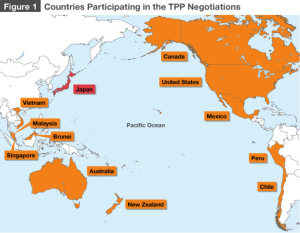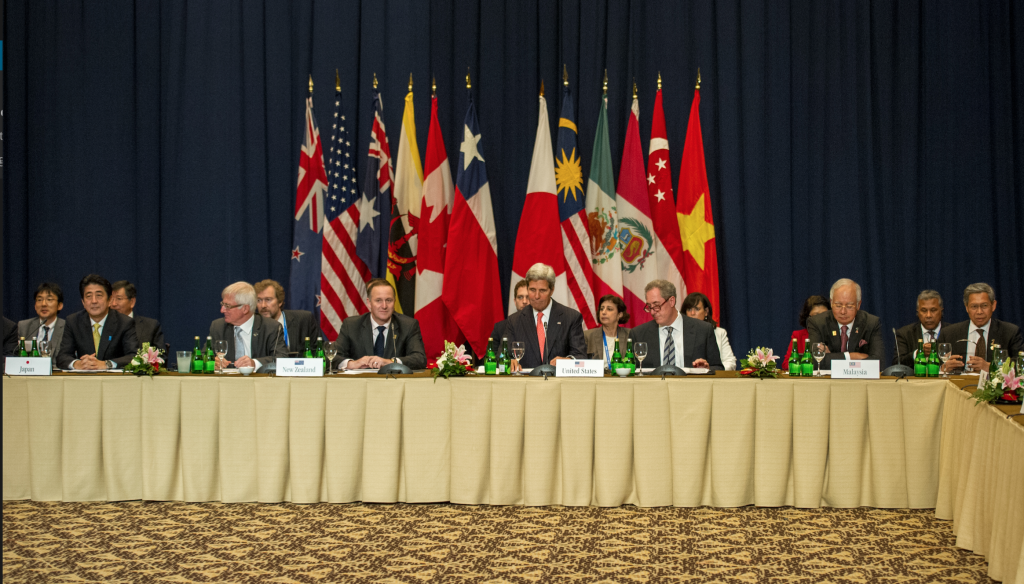Some Areas of Concern
 Jim Balsillie, former CEO of Research in Motion, called the Trans-Pacific Partnership (TPP) “the worst public policy decision in the country’s history.”[1] The TPP is a trade agreement between Pacific nations to achieve regional trade integration. Canada officially joined negotiations in 2012. The TPP has been subject to much controversy due to its expansive scope and lack of transparency, resulting in much criticism and public protest. A version of the text was released on 5 November, 2015 for public consultation before Parliament decides to ratify the agreement.
Jim Balsillie, former CEO of Research in Motion, called the Trans-Pacific Partnership (TPP) “the worst public policy decision in the country’s history.”[1] The TPP is a trade agreement between Pacific nations to achieve regional trade integration. Canada officially joined negotiations in 2012. The TPP has been subject to much controversy due to its expansive scope and lack of transparency, resulting in much criticism and public protest. A version of the text was released on 5 November, 2015 for public consultation before Parliament decides to ratify the agreement.
While there is always room for improvement in any law, the potential benefits to Canada are great. Nations currently engaged in negotiations represent 40% of the world’s GDP and 800 million people. Given that both Mexico and the US are participants in the negotiations, the TPP effectively supersedes the North American Free Trade Agreement (NAFTA) and Canada would be forced to ratify to avoid deterioration in our trade balance should both nations ratify the TPP.[2] Below is a commentary on the November draft and is restricted to the following topics:
Chapter 24 – Small and Medium-Sized Enterprises (SMEs)
A key achievement of the TPP is its recognition of the importance of SMEs. TPP nations have agreed to make the provisions of the TPP accessible to SMEs and encourage them to participate in international trade. A Committee on SMEs will be established to recommend ways to assist SMEs, allowing them to take full advantage of their commercial opportunities. Although some guarantees are provided in relation to government procurement contracts, it is hoped that the Committee establishes further measures to spur development in this critical economic sector.
Chapter 20 – Environmental
The TPP recognizes that commerce, when conducted in an unsustainable manner, leads to a multitude of environmental concerns and encourages corporate social responsibility to minimize future risks. Unfortunately, the TPP does not address the underlying environmental issue: climate change.[3] The TPP discusses many concerns, such as the protection of the ozone layer and transition to low-emission fuel sources, but these address mere side effects of climate change and do not tackle the root problem. An Environmental Committee will be established which will review public submissions and provide a forum to discuss environmental matters. Any consultations made with the Committee are only applicable to the parties at dispute rather than an environmental standard to be adhered to by all TPP nations.
Chapter 15 – Government Procurement
Government procurement represents a significant portion of government’s annual expenditure and includes projects such as infrastructure development, equipment purchases, and large research projects. Due to the expensive and complex nature of these projects, contracts for these projects are awarded through tendering processes. The TPP standardizes the tendering process and identifies which goods and services are to be covered. The tendering process is required when the government procurement is above a monetary threshold, and is to be non-discriminatory to all TPP party suppliers. The procuring entity must issue an intent to procure and give sufficient time for interested suppliers to submit bids. Transparency, accountability, and procedural fairness is enhanced for government procurements as TPP nations must establish an independent tribunal that is responsible for reviewing any complaints. Limited transitional rules are available for developing nations. These provisions only come into effect when individual nations reach agreements amongst themselves, with Canada already making agreements with Australia, Brunei, Malaysia, Vietnam, Mexico, and the US. While these provisions would give access to Canadian firms to participate in lucrative government contracts,[4] these provisions can be damaging to a nation’s economic health.
Expansionary fiscal policy comes in the form of tax cuts and increased government spending. For the policy to be effective, spending must be targeted to domestic firms. In doing so, the government would stabilize business profits, preventing domestic job loss during economic downturns. If a government cannot discriminate between domestic firms and foreign firms when awarding contracts, the only expansionary fiscal policy the government can rely on is decreases to domestic taxation. Developing nations have infantile taxation regimes and are thus reliant on government spending to spur economic growth. In the Canadian context, the loss of a critical economic policy may be more detrimental than the benefits of increased transparency and quality of government procurements.
Chapter 18 – Intellectual Property
Since the widespread adoption of the internet, intellectual property has become a source of economic prosperity for developed nations. While many of the provisions of the TPP appear similar to the Comprehensive Economic and Trade Agreement (CETA), there are a number of potential concerns.
Extension of Copyright Protection Term
Copyright protection under the TPP is extended from 50 years after the creator’s death to seventy years after the creator’s death.[5] While the international standard for copyright protection is fifty years after the creator’s death, it is questionable what gains can be achieved by extending protection for another twenty years, given that most revenues are earned within a few years of the content’s creation. Regardless, this extension will result in many works not entering the public domain for another twenty years.
Access to Health Care
While Articles exist in the TPP regarding the promotion of public health, Doctors Without Borders voiced strong criticism, noting that the TPP “will raise the price of medicines for millions by unnecessarily extending monopolies and further delaying price-lowering generic competition.”[6] Many nations that are part of the negotiations (such as Canada), or are contemplating whether to join the TPP, do not have universal drug coverage regimes. For people in these nations, access to affordable medications or generic drugs may be restricted, compromising public health. Given that many international organizations recognize the right to health care to be a fundamental human right (eg. UN, WTO), this may continue to be a controversial point during the ongoing negotiations of the TPP.
Fair Use
Both NAFTA and CETA require enforcement of intellectual property but neither agreement go to the extent of the TPP. The TPP mandates that parties establish and enforce criminal and civil procedures for infringements of intellectual property rights, and details these procedures at length. A limited exception is provided for fair use of trademarks but none is provided for copyrights, potentially stifling the creation of derivative works as they continue to be subject to the domestic law of the original creator’s nation instead of being covered by a standard fair use regime.[7] Demands for the release of software source code by a TPP nation are banned under the TPP, making future frauds—like the Volkswagen ‘defeat device’ scandal—possible under the TPP’s intellectual property regime.[8] [1] Andy Blatchford, Former BlackBerry Chief on TPP: ‘We’ve Been Outfoxed’, online: The Tyee <http://thetyee.ca/News/2015/11/09/Former-Blackberry-Chief-TPP>.
[2] Murray Becotte, A look at the Trans-Pacific Partnership and Canada, online: The Chronicle Journal <http://www.chroniclejournal.com/opinion/columns/murray_becotte/a-look-at-the-trans-pacific-partnership-and-canada/article_f19ae45a-9d00-11e5-9258-b3127b92112f.html>. [3] Dan Byrnes, SIERRA CLUB: TPP TEXT IS “CONCRETE EVIDENCE” OF TOXIC DEAL, online: Sierra Club < http://content.sierraclub.org/press-releases/2015/11/sierra-club-tpp-text-concrete-evidence-toxic-deal>. [4] Corinne Reichert, TPP to remove government procurement barriers, online: ZDNET <http://www.zdnet.com/article/tpp-to-remove-government-procurement-barriers>. [5] Trans-Pacific Partnership Agreement, online: Electronic Frontier Foundation <https://www.eff.org/issues/tpp>. [6] Judit Rius Sanjuan, ‘The negative impact on public health will be enormous:’ Statement by MSF on the conclusion of Trans-Pacific Partnership negotiations in Atlanta, online: Doctors Without Borders <http://www.msf.ca/en/article/the-negative-impact-on-public-health-will-be-enormous-statement-by-msf-on-the-conclusion-of>. [7] Supra note 5 [8] TPP Harmful To Open Source, online: Open Source Initiative < https://opensource.org/node/779>.

